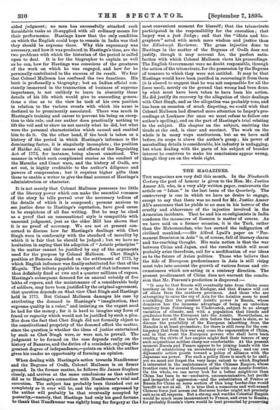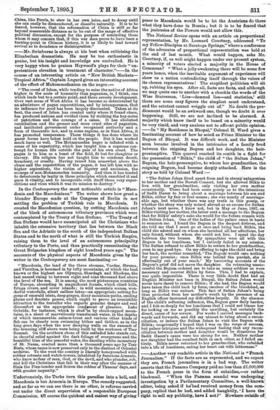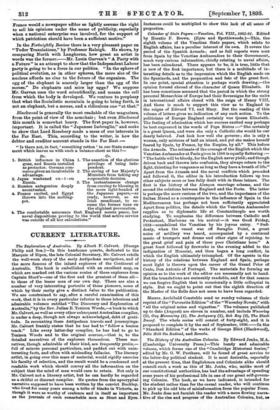THE MAGAZINES.
THE magazines are very dull this month. In the Nineteentla Century the post of honour is given to the Hon. Mr. Justice Ameer Ali, who, in a very ably written paper, controverts the article on " Islam " in the 'last issue of the Quarterly. The controversy is one in which we have no desire to engage, except to say that there was no need for Mr. Justice Ameer Ali's assurance that he yields to no man in his horror of the cruelty and abhorrence of the injustice involved in the Armenian incidents. That he and his co-religionists in India condemn the massacres of Sassoon is matter of course. As we have said on a former occasion, it is the Turk, rather than the Mahommedan, who has earned the indignation of civilised mankind.—Sir Alfred Lyall's paper on "Per- manent Dominion in Asia" is, of course, full of literary charm and far-reaching thought. His main notion is that the war between China and Japan, and the results which will most probably arise therefrom, call for a modification of our ideas as to the future of Asian politics. Those who believe that the tide of European predominance in Asia is still rising must take into account the growth of various forces and cir-
cumstances which are acting in a contrary direction. The present predicament of China does not warrant the conclu- sion that Mr. Pearson's prediction is disproved :—
" It may be that Russia will eventually take from China some territory on the Amur or in Kashgar, and that France will cut off slices from the southern provinces. And those who are attempting to raise the cry of Asia for the Asiatics seem to need reminding that the greatest Asiatic power is Russia, whose dominion has the immense advantage of being an unbroken territory from Petersburg to Vladivostok, subject to no abrupt variation of climate, and with a population that blends and graduates from the European into the Asiatic. Nevertheless, as one does not sell the bear's skin before the beast is slain, so to discuss the possibility of the European inheriting from the Manchu is at least premature ; for there is still room for the con- tingency that from this war may come the regeneration of China, and in that event the European powers who shall have been rending the skirts of her empire might find their tenure of any such acquisitions neither cheap nor comfortable. At the present moment Russia and France appear to be joining hands with the object of establishing an ascendency over China; and our own diplomatic action points toward a policy of alliance with the Japanese sea power. For such a policy there is much to be said; yet we must not forget the very large extent to which England is interested in the maintenance of the Chinese Empire, whose frontier runs for several thousand miles with our Asiatic frontier. On the whole, we can never look for a better neighbour than China has been to na—exclusive, uncommunicative, but pacific and incapable of aggression—and the substitution of France or Russia for China on some section of this long border-line would benefit us not at all. It is true that a numerous and well-armed Chinese force just across our Burmese border might not precisely suit us in all respects. But a strong and warlike Celestial Empire would be much more inconvenient to France, and even to Russia; for probably Russia's views would be best promoted by preserving
China, like Persia, to stew in her own juice, and to decay until she can easily be dismembered, or dissolve naturally. It is to be feared, however, that the reformation of China is still so far beyond measurable distance as to be out of the range of effective political discussion, except for the purpose of reminding those whom it may concern that, if this war does prove to have been a turning-point in Chinese history, it is as likely to lead toward revival as to decadence or disintegration."
—Mr. Swinburne is always at his best when criticising the Elizabethan dramatists. He may be too enthusiastic in praise, but his insight and knowledge are unrivalled. He is very happy when he praises Heywood's plays for their " un- pretentious elevation in treatment of character."—In the course of an interesting article on " New British Markets— Tropical Africa," Captain Lugard gives an interesting account of the effect of Mahommedanism on the negro :- " The creed of Islam, while tending to raise the native of Africa higher in the scale of humanity than paganism, is, I think, one which leads but to a certain point, and there arrests development. Over vast areas of West Africa it has become so deteriorated by an admixture of pagan superstitions, and by intemperance, that its influence for good has been largely discounted. Taken at its best, the creed of Islam has created unity where it found chaos, has produced nations and vivified them by striking the key-notes of patriotism and the courage of a cause. It has abolished cannibalism and the grosser and more cruel rites of paganism, and instituted government under recognised authority and a form of theocratic law, and in some regions, as in East Africa, it has promoted temperance. These things it has done where its purer forms have taken hold on the people. But it has worked much harm as well. The Mohammedan negro is inflated with a sense of his superiority, which has taught him a supreme con- tempt for human life outside the pale of his own creed. The pagan is to him as a beast of the field, fit but for slaughter or slavery. His religion has not taught him to condemn deceit, treachery, or cruelty. Having raised him somewhat above the
chaos and the superstition of pagan, it has left him with no higher aspirations, the victim of bigotry and exclusion, the scourge of non-Mohammedan humanity. And then it has tended to deteriorate by laxity in those principles which ennobled it and gave it vitality, and to incorporate with itself those very super- stitions and vices which it was its mission to destroy."
In the Contemporary the most noticeable article is "Mace- donia and the Macedonians." The writer shows how great a blunder Europe made at the Congress of Berlin in not settling the problem of Turkish rule in Macedonia. It created the Macedonian question, by cutting Macedonia out of the block of autonomous tributary provinces which were contemplated by the Treaty of San Stefano. "The Treaty of San Stefano would have emancipated all the Christians who inhabit the extensive territory that lies between the Black Sea and the Adriatic to the south of the independent Balkan States and to the north of what is still the Turkish Empire, raising them to the level of an autonomous principality tributary to the Porte, and thus practically resuscitating the Great Bulgarian kingdom of eight hundred years ago." The accounts of the physical aspects of Macedonia given by the writer in the Contemporary are most fascinating :— " Macedonia, the land of the three streams, Vardar, Struma, and Vistritsa, is hemmed in by lofty mountains, of which the best known or the highest are Olympus, Shardagh and Rhodope, the last named rising to between eight and nine thousand feet above the level of the sea. It is among the most picturesque countries of Europe, abounding in magnificent forests, which climb bills, fringe rivers, and cover islands ; in wild mountain scenes, won- derful waterfalls, silent sailless lakes—an appropriate setting for gems of emerald islets, deep gorges, dizzy mountain-paths, smiling plains and desolate passes, which ought to prove an irresistible attraction to the traveller who regards genuine danger and real discomfort as the appropriate condiment of pleasure. Lake Ochrida, for instance, which is shuein by cloud-capped moun- tains, is a sheet of marvellously translucent water, in the depths of which innumerable salmon-trout and various other kinds of fish can be clearly seen swimming hither and thither, as in the long gone days when the now decaying walls on the summit of the towering cliff above were being built by the workmen of Tsar Samuel. On the southern shore of this secluded lake stands out, in cheerful relief against the dark foliage of evergreens and the beautiful blue of the peaceful water, the dazzling white monastery of St. Naum, erected more than a thousand years ago by Tsar Boris, whose name is now preserved only in the dustiest of Oriental archives. To the west the country is literally honeycombed with robber retreats and watch-towers, inhabited by ferocious Arnauts, who know no fear of man, God, or the devil, and who plunder, rob, aid kill the Christians that fall in their way after the manner of Sinis the Pine-bender and Sciron the robber of Theseus' days, and with greater impunity."
Unfortunately, the Turks turn this paradise into a hell, and Macedonia is bat Armenia in Europe. The remedy suggested, and as far as we can see there is no other, is reforms carried out under the direct supervision of a responsible European Commission. i/f course the quickest and easiest way of giving
peace to Macedonia would be to let the Austrians do there what they have done in Bosnia ; but it is to be feared that the jealousies of the Powers would not allow this.
The National Review opens with an article on proportional representation, by Mr. Leonard Courtney, addressed " To my Fellow-Disciples at Saratoga Springs," where a conference of the advocates of proportional representation was held at the end of last month. What would happen, asks Mr. Courtney, if, as well might happen under our present system, a minority of voters elected a majority in the House of Commons? " What a jolly awakening there will be some few years hence, when the inevitable argument of experience will show us a nation contradicting itself through the voices of its chosen representatives ! The stupidest politician will sit up, rubbing his eyes. After all, facts are facts, and although we may quote one to another with a chuckle the words of the Wise Statesman, ' Lies—damned lies—and statistics,' still there are some easy figures the simplest must understand, and the astutest cannot wriggle out of." No doubt the pre- dicament would be an awkward one, though we doubt it ever happening. Still, we are not inclined to be alarmed. A majority which knew itself to be based on a minority would be very timid, and very anxious not to affront public opinion. —In " My Residence in Bhopal," Colonel H. Ward gives a fascinating account of how he acted as Prime Minister to the Begum of Bhopal. It was difficult work, and the Minister soon became involved in the intricacies of a family feud between the reigning Begum and her daughter, the heir- presumptive. This quarrel reached its zenith in a fight for the possession of " Bilkis," the child of " the Sultan Jehan," Begum, the heir-presumptive, to whom her grandmother, the reigning Begum, had become deeply attached. Here is the story as told by Colonel Ward :— " The Sultan Jehan lived apart from and in strong'antagonism to her mother and the Nawab Consort, but she allowed Bilkis to live with her grandmother, only visiting her own mother occasionally. There had been some gossip as to the intentions of Sadik Hasan to bring about a marriage between his son and Bilkis, either by fair or foul means ; she was nearly of marriage- able age, but whether there was any truth in this gossip, or whether the story was only noised abroad as an excuse for Sultan Jehan's next move, I know not, but in May or June, 1881', on Bilkis visiting her mother, the latter sent a message to the Begum that for Bilkis' safety's sake she would for the future remain with the Sultan Jehan. One of the ladies of the palace came in haste to summon me. I found the Begum in the deepest distress, and she told me that I must go at once and bring back Bilkis, the child she adored and on whom she lavished all her affections, her only friend, without whom she could not live. I spent the day between the two houses. My sympathies were all with the Begum in her loneliness, but I entirely failed in my mission. The Sultan refused to allow Bilkis to return to her grandmother, even to say good-bye. On my offering to take the child and bring her back, the mother remarked, The Beguni would care nothing for your promise ; once Bilkis was behind the purdah, she is effectually out of your reach.' My harrowing accounts of the Begum's grief did not move the daughter. On returning unsuc- cessful the Begum ordered me to take as many soldiers as were necessary and recover Bilkis by force. This, I had to explain, was quite impossible. There is very little doubt that had an English Minister not been in Bhopal, the Sultan Jehan would never have dared to remove Bilkis ; if she had, the Begum would have taken the child back by force, careless of the bloodshed, as long as Bilkis was unhurt. This fact of Sultan Jehan's being thus protected from her mother's wrath by the presence of an English officer increased my difficulties largely. In the absence of the child's softening influence, the, Begum grew daily harder, and I felt so deeply for her loneliness that I could not blame her for looking on me as possibly the unwilling, bat certainly the direct, cause of her sorrow. For weeks I carried messages back- wards and forwards, and did my utmost to bring about a recon- ciliation, or induce the Sultan Jehan to visit the Begum with Bilkis; occasionally I hoped that I was on the verge of success, but palace intrigues and the widespread feeling that any recon- ciliation between mother and daughter would be disastrous for Sadik Hasan's cause were too strong for me. Neither mother nor daughter had the smallest faith in each other, so I failed en- tirely. Bilkis never returned to her grandmother, who subsided into a life of loneliness, eating her heart out with bitterness."
Another very readable article in the National is "French Journalism." If the facts are as represented, and we expect they are, French journalism is in a bad way. The writer asserts that the Panama Company paid no less than £1,000,000 to the French press in the form of subsidies,—or rather blackmail. " When the Panama scandal was undergoing: investigation by a Parliamentary Committee, a well-knows! editor, being asked if he:had received money from the com,. pany, replied that he had, and added haughtily, I have the right to sell my publicity, have I not?' Nowhere outside ot
France would a newspaper editor so lightly assume the right to sell his opinions under the name of publicity, especially when a national enterprise was involved, for the support of which patriotism should have been a sufficient motive."
In the Fortnightly Review there is a very pleasant paper on "Tudor Translations," by Professor Raleigh. He shows, by comparing North with Langhorne, how great an artist in words was the former.—Mr. Louis Garvan's " A Party with a Future" is an attempt to show that the Independent Labour party is going to be a force in our politics. "In the sphere of political evolution, as in other spheres, the mere size of the nucleus affords no clue to the fixture of the organism. The egg of the elephant is scarcely larger than the egg of the mouse." Do elephants and mice lay eggs ? We suppose Mr. Garvan uses the word scientifically, and means the cell from which the body is developed. We venture to prophesy that what the Socialistic mountain is going to bring forth, is not an elephant, but a mouse, and a ridiculous one "at that."
Blackwood is generally the most readable of the magazines, from the point of view of the armchair; but even Blackwood this month is somewhat heavy. The first paper is, however, important. It is called the "Japanese Imbroglio," and seeks to show that Lord Rosebery made a mess of our interests in the Far East. This, according to the writer, is how the debtor and creditor account stands in the Far East :—
" Is there not, in fact, ' something rotten ' in our State manage- ment which leaves us with such a balance-sheet as this ?-
Dr. Cr.
1. British influence in China 1. The assertion of the glorious gone, and Russia installed privilege of being inde- as protector. German corn- pendent. merce given an incalculable 2. The saving of her Majesty's advantage. Ministers from taking any
2. Japan weakened vis - a - vis responsible decision.
Russia. 3. The instantaneous change 3. Russian antagonism deeply from cursing to blessing in accentuated. the more light-headed of 4. France excited, and Egypt the Japanese papers,—as thrown into the melting- ready, however, as an pot. Irish mendicant, to re- sume the former tune on the slightest provocation.
4. The comfortable assurance that England means peace, her naval dispositions proving to the world that active service was outside of all her calculations."




































 Previous page
Previous page